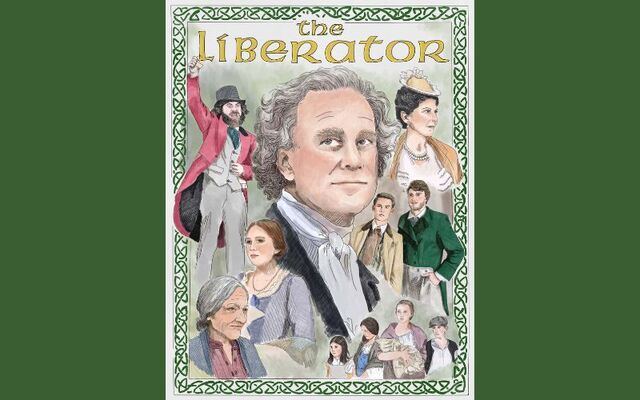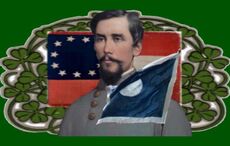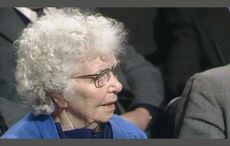For better or worse, I finally did it. Pick your idiom: I put my hat in the ring; took the plunge; stepped up to the plate.
After 30 years in a corporate office, I left my job, ponied up some money, cajoled my family and friends, took all manner of classes, hired talented people, and made a movie about my hero, Daniel O’Connell.
It had to be made. A decade ago, there was brief stir when it was reported that Steven Spielberg and Daniel Day-Lewis might take up the task. They didn’t.
O’Connell has been lost to time and a scourge of dark history. But he was bigger, and more influential, than Emmet, Tone, or even Collins. Can you imagine, 100 years from now, African Americans having virtually no understanding of Martin Luther King, Jr? That’s where O’Connell has gone.
The seed for my magnus opus was planted in what now seems a vastly different place and time - Cork City in 1985.
Times then and there were tight. Jobs and opportunity were scarce. Unemployment exceeded 17 percent. It felt like 50. Christy Moore’s lament for the Ordinary Man resonated deeply.
Amusements then seem simple in today’s light. In my local, Mick Crowe’s, proprietress Kathleen deftly stacked chips of anthracite on the damp-chasing fire, knit sweaters, and drew your pint in exchange for a carefully stacked pile of Irish coins, all while keeping bad language to a minimum. Observance of holy hour started at 2:30 pm, the doors were locked and shades pulled. Snuff was discreetly enjoyed by smiling matrons.
Sports TV was snooker, watching a white-gloved umpire place a cue ball for players to strike colorful balls across green felt until all disappeared with a clink. Except of course when Barry McGuigan was boxing. Then the entire country paused, held its breath, and watched the match.
I had then arranged to study literature at University College Cork. Aptly, the school labeled my status as an “occasional” student and I delighted in embracing the American interpretation of that word.
My professor, and famed poet, inasmuch as a modern poet can be famed, John Montague, roamed Cork muttering something about dark alleys. My paper for him merited a decent mark and single word of commentary: "Sound."
In my Irish History class, I found myself unavoidably tasked with an essay, but on a subject of my choosing. Well, this Daniel O’Connell character seemed ubiquitous - statues, street signs, picture on the Irish 20 pound note. How hard could it be? But what did he do?
Back to my most trusted source, Kathleen.
“Kathleen, this Daniel O’Connell, what did he do?” I asked prior to proffering my note for a jar.
She exhaled a cloud of blue cigarette smoke. “Oh, he was great man, Billy. A great man.”
“So what did he do?”
“Daniel O’Connell, is it?”
“Yes.”
“The Liberator, is it?”
“Yes.”
Another exhalation.
“Oh, he was a great man Billy, a great man.”
Read more
So I opened a book and read. And he was a great man. In fact, one historian said the greatest.
A brilliant attorney. A captivating orator. A magnetic personality. A powerhouse of energy. A duelist. Vain. A spendthrift. A staunch abolitionist. A marriage for love over money. A man who built a national identity. A Christian committed to peace and seeing the humanity of all people.
He had his victories - emancipation, representation, rights, jobs.
But he didn’t get everything and second guesses flooded in. Illness struck and he died in the midst of the Famine. Understandably, his decisions, tactics, and personality are controversial. But his influence is undeniable.
How had I never heard of him? How had the Irish people lost track?
His story should be told. And cinematically.
I wrote draft after draft of screenplays. Finally, one seemed good and won some script competitions.
I tried, really tried, every connection I could imagine to connect with the film industry.
Certainly a big movie studio would want to make this film.
They didn’t.
So I adapted my script to a stage play. With the help of good friends, we put on several successful performances.
A few years later, we made the film ourselves.
The process was intense but rewarding. Months of planning included scouting locations, casting actors, recruiting extras, renting equipment, and finding costumes and props. Next, six weeks of shooting two or three scenes a day with no margin of error for sick time, car trouble, or bad weather. Then, a year of editing, sound mixin,g and musical scoring.
Finally, "The Liberator" was finished and released. A film about Daniel O’Connell can be viewed.
Some like it. Some don’t. Fair enough.
Now, O’Connell’s story is out in film and it’s relevant and important. Where and when is that line crossed to violence to achieve political ends? What faith, hope and sacrifices are required for peace?
I admire Daniel O’Connell for his faith, tenacity, wit, courage and, as historian Wendell Phillips observed, “lofty, generous purpose of his whole life.”
And like my hero, not every goal of mine was accomplished or dream realized. But like my hero, I gave it my all.
You can watch the official trailer for "The Liberator" here:
You can learn more about "The Liberator" on the film's website.
This article was submitted to the IrishCentral contributors network by a member of the global Irish community. To become an IrishCentral contributor click here.




Comments